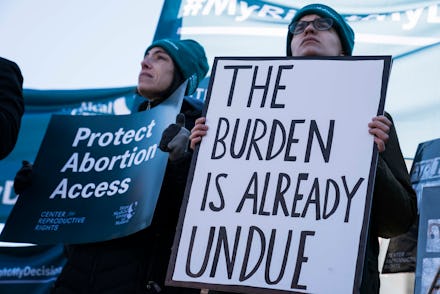States have dubbed abortions a "non-essential" service during coronavirus

As the number of coronavirus cases continues to climb in the U.S., Texas and Ohio are aiming to preserve hospital beds and facilities for COVID-19 patients and those in need of other "essential" medical services. And in those two states, abortion is not considered "essential."
On Monday, Texas Attorney General Ken Paxton issued a statement that categorized abortion as "non-essential," meaning people in the state would not be able to access the procedure until the order expires April 21. Failure to comply would result in a $1,000 fine or 180 days in jail. Last week, Ohio became the first state to deprioritize abortion this way, with Ohio Attorney General Dave Yost stating that clinics would be forced to halt all surgical abortions.
The problem is that putting a block on abortions for nearly a month will make the procedure much, much harder for patients to access when the order expires. Most people don't realize they're pregnant until they're about six weeks along, and most abortions are performed at less than 13 weeks of gestation. Under these orders, a patient who realizes they're pregnant now or gets pregnant now may potentially require a more costly procedure, given how long they'll likely have to wait to access abortion care.
"Abortion is essential, time-sensitive health care that must remain available during this pandemic — particularly because every pregnancy is unique and brings significant health risks," Nancy Northup, the president and CEO of the Center for Reproductive Rights, told Mic in an email. "The crisis also exposes the cruelty of anti-abortion policies that have unjustifiably shut down clinics in many states."
"It’s dangerous to risk the lives of pregnant people because we know abortion still happens when extreme restriction are enacted."
In Ohio, Yost wrote a letter to abortion clinics in Dayton, Cleveland, and Cincinnati, saying, "You and your facility are ordered to immediately stop performing non-essential and elective surgical abortions. Non-essential surgical abortions are those that can be delayed without undue risk to the current or future health of a patient." In Texas, Paxton looped "any type of abortion that is not medically necessary to preserve the life of the mother" in with other health care procedures "that are not immediately medically necessary, such as orthopedic surgeries."
Planned Parenthood of Ohio issued a statement in response to Yost's letter, saying that they would comply with necessary measures including wearing protective equipment, but would continue with "providing essential procedures, including surgical abortion."
Meanwhile, Kathy Miller, the president of the Texas Freedom Network, a grassroots nonpartisan organization that fights for civil liberties in the Texas legislature, said in a statement that reproductive care is indeed "essential care." "There are many reasons women decide to have an abortion in the already limited time window state law allows, and a delay means denying them the constitutional right to make those decisions in a safe, timely manner with the help of their doctors."
Louisiana may be headed in a similar direction as Texas and Ohio. Over the weekend, Democratic Gov. John Bel Edwards issued a letter stating that all elective medical and surgical procedures would no longer be permitted. The letter does not specifically state whether abortion is considered "elective," but neither did Texas's initial order. Instead, Yost later issued a directive classifying abortion care as non-essential.
These kinds of laws will impact poor and Americans of color disproportionately, Texas-based abortion provider and counselor Paige Alexandria told Mic in an email. The move to change abortion laws in the face of a public health crisis sets a "dangerous precedent," she says.
2020 is shaping up to be another fierce year on the frontlines of reproductive care. Earlier this month, the Supreme Court heard oral arguments in the case of June Medical Services v. Russo, which will decide whether Louisiana can lawfully require physicians who provide abortions to have admitting privileges at a nearby hospital. Admitting privileges impose unnecessary restrictions on abortion providers and typically result in shuttered clinics.
Meanwhile, in addition to new restrictions on the procedure possibly stemming from the coronavirus outbreak, a bills in Texas, Ohio, and Louisiana are aiming to limit certain kinds of abortion procedures. In Ohio, the state legislature is considering a bill that would outlaw telemedicine abortion, a service that allows a patient to conduct an at-home medication abortion via two abortion pills, while being counseled online by an abortion provider.
The move to limit abortions at clinics doesn't stop abortions, Alexandria says. State-imposed limitations simply stop physician-administered abortions — which puts patients' lives at risk.
"It’s dangerous to risk the lives of pregnant people because we know abortion still happens when extreme restriction are enacted," she says, "and we know that people die from unsafe abortion as a result of them."